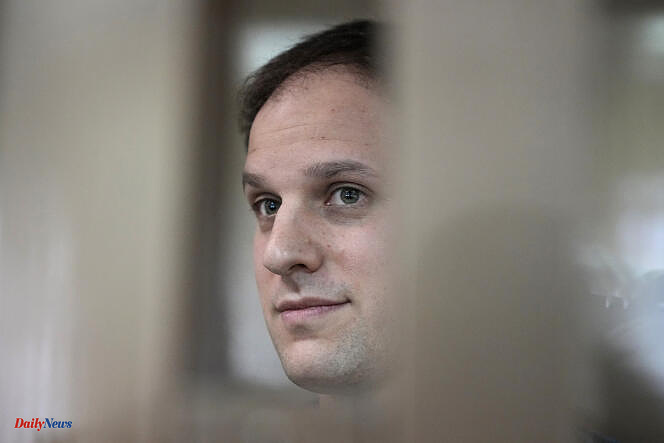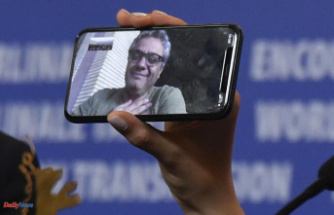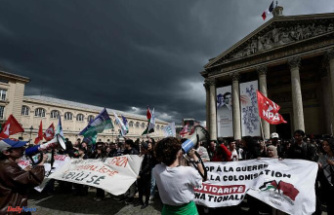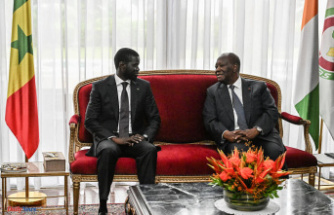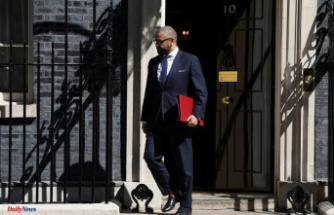To remind its readers, and the world in general, that one of its journalists has been a prisoner in Russia for a year, The Wall Street Journal left a large empty rectangle on its front page dated Friday, March 29. The headline: “His article should be here.” The short text that overlooks the white space: “A year in a Russian prison. A year of stolen stories, stolen joys, stolen memories. Crime: Journalism.” Above, the name and drawn face of his correspondent in Russia, Evan Gershkovich.
A year ago today, the 32-year-old American journalist was arrested by the FSB while reporting in the Urals. He was then accused of “espionage”, the first foreign journalist to be in Russia since Nicholas Daniloff in 1986, then imprisoned in the infamous Lefortovo prison in Moscow. An accusation, punishable by twenty years in prison, which he rejects, just like his newspaper, the United States and his family.
She sent him a message on Friday through a letter to readers published in The Wall Street Journal. “We never envisioned something like this happening to our son and brother, let alone spending an entire year in uncertainty. But despite this long battle, we remain strong, they write. Through all the challenges of this tumultuous time, we have seen Evan face this uncertainty, stuck in this small cell, with little news of the world, without his freedom. We saw him face it with his head held high because he is innocent. We will continue to fight for Evan's freedom, whatever the cost. »
No proof of his guilt in a year
Evan Gershkovich is a recognized professional, living in Russia for six years at the time of his arrest and speaking Russian perfectly. Before joining The Wall Street Journal in 2022, he was a correspondent for Agence France-Presse in Moscow and, before that, for the English-language newspaper Moscow Times, where he published high-quality investigations during the Covid-19 pandemic.
Unlike many American journalists, he decided to stay in Russia after the invasion of Ukraine in February 2022. It was not his country of origin, but that of his roots, of his parents, of Soviet Jews who fled the USSR in the 1970s.
During his arrest in the city of Yekaterinburg, he appeared to be working on sensitive issues: the arms industry and the Wagner paramilitary group. Russian services accused him of trying to “obtain secret information” at the request of the United States. The Kremlin claims to have caught him “in the act” of spying. None has since given any evidence publicly, the procedure having been classified secret.
White House vows to 'work tirelessly' for his release
Since then, there have been more than a dozen hearings before the Moscow Municipal Court, with regular extensions of his pre-trial detention. The latest was on March 26, when a judge ruled that he would remain in prison until June 30, awaiting a possible trial that was constantly postponed. A “particularly painful” day, said the American ambassador to Moscow, Lynne Tracy, present at the hearing, because it was a few days before the first anniversary of his arrest. “The accusations against Evan are absolutely false,” she said, using the word “fiction.”
Asked on Thursday about the fate of the American journalist, about the possibility of a trial or even an exchange, Kremlin spokesperson Dmitri Peskov replied that he had “no information on the court , it is not within our prerogatives.” “As for an exchange, we have repeatedly emphasized that there are certain contacts, but that they must be carried out in absolute silence,” he added.
The United States accuses the Kremlin of arresting American citizens for false reasons to use them as bargaining chips against Russians imprisoned abroad. Russian President Vladimir Putin has raised the idea of an exchange for Vadim Krasikov, imprisoned for life in Germany for the murder of a Chechen opponent in Berlin in 2019
“We will continue to denounce Russia’s scandalous attempts to use Americans as bargaining chips and take sanctions,” US President Joe Biden said on Friday. On the “painful anniversary” of Evan Gershkovich’s arrest, he promised to “work tirelessly to secure [his] release.”
Remote Chess, Arsenal and Prison Kitchen
Several of the journalists Evan Gershkovich knew in Moscow and elsewhere demonstrated on Friday in Berlin, again to remind their readers, and as many people as possible, of the fate of their colleague and friend. Those who spoke with him during his year of detention report that he spent 23 hours a day in his cell, reading books in English and Russian, writing letters to friends and family. The latter, in exchange, keep him informed of what is happening outside his four walls.
Guardian journalist Pjotr Sauer, for example, keeps him informed of the results of the Arsenal football team, his favorite club in England, which is having one of its best seasons in years. “He is very happy with Arsenal's form but clearly upset that he can't see it with his own eyes,” Pjotr Sauer told the Associated Press. A recent Arsenal victory, of which he heard snippets in Russian on television, lifted his morale. “Spring came early and the guys gave me a very happy Wednesday morning,” he wrote in a message that reached his Wall Street Journal editorial office.
With his parents, he also tries not to talk only about his situation, about the trying year that has slowly passed. He plays mail chess with his father, Mikhail Gershkovich. And he thanks his mother, Ella Milman, for introducing him to Russian porridge in his youth. This prepared him “for better or worse for the Russian prison,” and for its cuisine.

